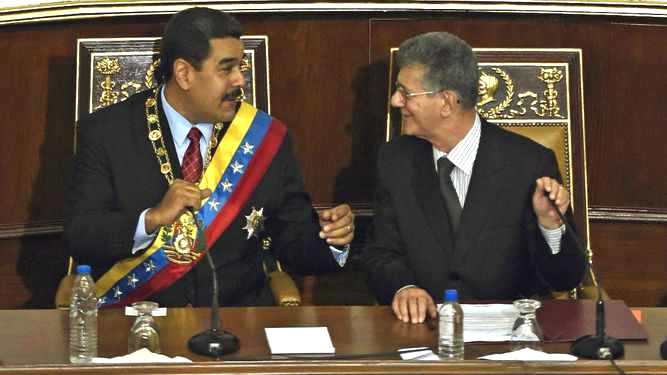
Venezuela: A change in the scenario
Two developments stand out from the events of Friday (Jan. 15) in Venezuela: the release of official economic data after a year of a statistical blackout, and the smooth presentation of the president’s annual report, followed by a parliamentary response.
The Central Bank reported (as of the third quarter of 2015) an annual inflation rate of 141.5 percent, a drop in the domestic product of 7.1 percent and a deficit in the current account of 5.05 billion dollars.
The decision to acknowledge that and other facets of the economic reality showed that reporting the facts is not an act of “war,” as the official discourse suggested in the past several months.
For the Memoire and Account ceremony, as the executive’s management report is called, President Nicolás Maduro attended a session of the National Assembly dominated by his adversaries, who listened to him.
The leader of Congress, Henry Ramos Allup (in photo at top with President Maduro), replied and presented the opposition’s vision and agenda.
Both sides restated their theories: an “economic war” against “the failure of the model.” They disagreed even over the portrait of Bolivar.
There were shouts and interruptions, but both the majority and the minority officials remained in their seats. The entire session was broadcast over radio and television.
Maduro made the first move by proposing a Commission of Justice, Truth and Peace to examine the violence of 2014. It was a counteroffer to the plea of amnesty for the incarcerated oppositionists made by the current parliamentary majority.
The initiative does not satisfy the opposition’s plea but goes beyond the previous official position, which totally refused to deal with the issue.
The release of official figures was indispensable to support the decree of economic emergency issued by Maduro.
The decree does not give precise measures, but grants powers of exception to the president. It needs to pass the Assembly, whose opposition majority will have to opt between giving full powers to Maduro, denying such powers or — as suggested by Ramos Allup — discussing the project item by item.
The conflict between the two major forces has changed scenario but, considering the unprecedented parliamentary struggle, the nation did not collapse.
(Taken from the blog ‘Del gran Caribe’ in the Mexican newspaper La Jornada.)


